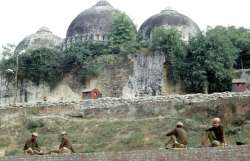Ayodhya dispute: SC rejects plea for daily hearing, questions Swamy’s locus standi
In a development that potentially douses hopes for a quick resolution to the Ayodhya dispute, the Supreme Court today turned down a petition filed by BJP Rajya Sabha MP Subramanian Swamy seeking daily hearings in the Ram Temple-Babri Masjid matter.

In a development that potentially douses hopes for a quick resolution to the Ayodhya dispute, the Supreme Court today turned down a petition filed by BJP Rajya Sabha MP Subramanian Swamy seeking daily hearings in the Ram Temple-Babri Masjid matter.
Rejecting Swamy’s plea, the Supreme Court today said that it is not possible to hold hearings on an immediate basis due to scarcity of time.
The parties involved also questioned Swamy’s locus standi in the matter and termed his involvement in the case as an outside interference. Questioning Swamy’s locus standi, the apex court reprimanded Swamy for not informing the court that he was not "a party to the case”.
“What is your locus standi in the case? We don't have time to hear you now,” the Supreme Court bench told Swamy. In its last hearing in the case, the apex court had said that the Ram Mandir dispute be settled out of court and the CJI had even offered to mediate if need be.
Swamy, in his petition, had pleaded before court to hear the decade-old case on a day-to-day basis and pass an order favouring immediate construction of Ram Temple in Ayodhya.
Reacting to the development in a tweet, Swamy said that the court’s decision not to accord an urgent hearing in the case as a temporary victory for those who wished to see a delay in arriving at a solution in the matter.
“The judges said they have no time and adjourned the matter. In other words those who wanted delay succeeded. I will try another route soon,” Swamy tweeted.
Swamy further responded to the SC’s query on him being party to the matter. “I said I had made clear that I was on Fundamental Right to worship issue,” he added.
On March 21, the Supreme Court, terming the Ram Mandir as ‘sensitive’ and ‘sentimental’, had suggested an out-of-court settlement. The top court had set March 31 as the deadline for all the parties involved to present their stance over the issue.
While most of the parties, including VHP, RSS, BJP, have welcomed the court's suggestion, the Babri Masjid Action Committee (BMAC) had rejected the idea, saying time for amicable settlement of the issue is long over.
AIMIM chief Asaduddin Owaisi had also favoured daily hearing in Supreme Court over the Ayodhya temple dispute and said the case is about who has the title of the disputed land.
Owaisi also said he was waiting to see if "conspiracy charges" would be held against senior BJP leaders in the matter.
In May 2016, the Supreme Court had stayed the Allahabad High Court verdict that directed division of 2.77 acres of land of the disputed Ram Janmabhoomi-Babri Masjid site in Ayodhya into three parts among Hindus, Muslims and the Nirmohi Akhara.
A Bench of Justices Aftab Alam and R.M. Lodha, admitting a batch of appeals from both Hindu and Muslim organisations, stayed the September 30, 2010 judgment of the Lucknow Bench of the High Court and directed the parties to maintain the status quo at the site.
